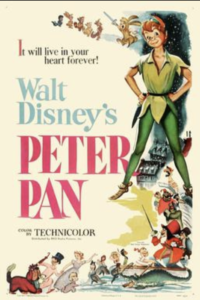1953 Havana, Cuba

Maria Elena Lagomasino
Born in 1949
Havana, Cuba
Interviewed on September 15, 2019
by Maria Elena (M.E.) Cunningham
I remember getting into the car with my mom in the blistering Havana heat. I must have been only around four years old and she was taking me to see my first movie: Peter Pan. I exhaled in relief as we entered the cool, air-conditioned, elegant theater, El Teatro Rodi. It was located just a few blocks from el Malecón, the famous seawall where the ocean waves rhythmically slam into the Havana coastline. We sat curled up in the red velvet seats, waiting for the movie to start, staring toward the stage, where the movie screen was initially covered by heavy curtains. It smelled like rositas de maiz [popcorn] and cigarettes. The ushers, dressed to the nines, walked up and down the aisles carrying trays of candy slung around their necks – I was too excited to think about snacks.
Looking back, I realize I did not understand English, the language the movie was in, and yet, that did not seem to bother me at all. I was transported into the movie. I remember loving the animation, the bright green and blue colors, and the music. I loved watching the characters fly, specifically when Peter whisked Wendy away from her window. Although later I could not remember much of the plot, I do remember being terrified by Tick Tock the crocodile. In the days and even months that followed, I remained convinced that he was under my bed. I knew that if I got out of bed, he would be waiting for me with open jaws. I did not want to be eaten up. My mother realized that I had started to have some nightmares, and she thought that I had been traumatized by Captain Hook, who, like my own father, was missing an arm. She played shrink and gathered that being scared of Captain Hook really meant that I was scared of my father. I think she even got mad at him for it. She always stubbornly insisted that her analysis of the situation was accurate, even though really, it was just Tick Tock that kept me up at night.
As I grew older, I often reflected upon watching Peter Pan with my mother that afternoon in Havana. Little did I know how much I would later identify with the film. We left Cuba as exiles in 1960 when I was 11 years old. I, like Wendy, had to become a mother figure for my five younger siblings (four of them boys) in a strange and foreign land. They were quite mischievous and wild, usually up to no good, lost in their new country. Unlike Wendy, however, I am not sure I always handled them with incredible patience.
The other odd coincidence with Peter Pan is that the name became synonymous with fleeing the Cuban revolution. When Fidel Castro began tightening his grip on Cuba, scared parents became worried about the fate of their children. The Catholic Church began an operation named Operación Pedro Pan, in which Cuban parents sent 14,000 unaccompanied children to the United States between 1960 and 1962. The children were sent to foster homes and families under the guidance of the Catholic Welfare Bureau. Often, they never saw their parents again until they themselves were grown and with children of their own. I believe that Operación Pedro Pan was named after a boy who fled Cuba in 1960, but also after the movie Peter Pan because all of the children were exiled and lost in a new country without their parents. Luckily, I left Cuba with my family, but it gives me pause to think that the title of the first movie I ever saw would come to have such a parallel with one of the most momentous events in my life – the Cuban exile.
When you asked me to reflect on my first movie, I found myself wondering about what might have become of El Teatro Rodi. I assumed that the once beautiful theater had turned to ruin from years of neglect, much like the other places that I loved in my childhood. However, my Google search revealed that the theater is thriving under a new name, El Teatro Mella. Now a forum for government propaganda, the theater sponsors performances by groups such as the National Ballet of Cuba, as well as political speeches still praising the revolution. In 1953, when my mother and I sat in our red velvet chairs, we did not know that one day our seats would be filled with the very people responsible for our exile. On that hot day, it was not about politics, but instead, it was a day out with my mother who loved me, an exciting new experience, and a trip to Neverland.
